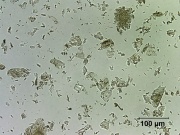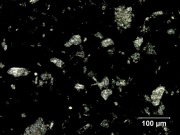Difference between revisions of "Calcium sulfate"
Jump to navigation
Jump to search
(username removed) |
|||
| (4 intermediate revisions by 4 users not shown) | |||
| Line 1: | Line 1: | ||
[[File:6_Calcium_sulfate_200X.jpg|thumb|Calcium sulfate]] | [[File:6_Calcium_sulfate_200X.jpg|thumb|Calcium sulfate]] | ||
== Description == | == Description == | ||
| + | [[File:6_Calcium_sulfate_200X_pol.jpg|thumb|Calcium sulfate]] | ||
| + | Commonly found in three forms: anhydrous ([[anhydrite]]), dihydrate ([[gypsum]]) and hemihydrate ([[plaster of Paris]]). Anhydrite is a colorless, inert pigment which is often used as a paper filler. Calcium sulfate dihydrate is used in the manufacture of portland cement. Gypsum is also used as a filler and pigment in paints, enamels, glazes, and paper. Plaster of Paris is used for wall plaster, wallboard, moldings, and statuary. | ||
| − | + | See more information on the pages for each form of hydration. | |
| − | |||
== Synonyms and Related Terms == | == Synonyms and Related Terms == | ||
anhydrite; gypsum; plaster; terra alba; alabaster; calcium sulphate (Br.); mineral white; crown filler; alabastine; pearl filler | anhydrite; gypsum; plaster; terra alba; alabaster; calcium sulphate (Br.); mineral white; crown filler; alabastine; pearl filler | ||
| − | == | + | == Risks == |
| + | |||
| + | * Noncombustible | ||
| + | |||
| + | ==Physical and Chemical Properties== | ||
Particle size = 0.2 micrometers | Particle size = 0.2 micrometers | ||
| Line 27: | Line 32: | ||
| 1.21; 1.52; 1.53 | | 1.21; 1.52; 1.53 | ||
|} | |} | ||
| − | |||
| − | |||
| − | |||
| − | |||
== Comparisons == | == Comparisons == | ||
| Line 36: | Line 37: | ||
[[media:download_file_529.pdf|Characteristics of Common White Pigments]] | [[media:download_file_529.pdf|Characteristics of Common White Pigments]] | ||
| + | ==Resources and Citations== | ||
| − | + | * Richard S. Lewis, ''Hawley's Condensed Chemical Dictionary'', Van Nostrand Reinhold, New York, 10th ed., 1993 | |
| − | |||
| − | |||
| − | * | ||
* ''Van Nostrand's Scientific Encyclopedia'', Douglas M. Considine (ed.), Van Nostrand Reinhold, New York, 1976 | * ''Van Nostrand's Scientific Encyclopedia'', Douglas M. Considine (ed.), Van Nostrand Reinhold, New York, 1976 | ||
| − | * | + | * Random House, ''Webster's Encyclopedic Unabridged Dictionary of the English Language'', Grammercy Book, New York, 1997 |
* ''The Merck Index'', Martha Windholz (ed.), Merck Research Labs, Rahway NJ, 10th edition, 1983 Comment: entry 1753 | * ''The Merck Index'', Martha Windholz (ed.), Merck Research Labs, Rahway NJ, 10th edition, 1983 Comment: entry 1753 | ||
| Line 50: | Line 49: | ||
* ''The American Heritage Dictionary'' or ''Encarta'', via Microsoft Bookshelf 98, Microsoft Corp., 1998 | * ''The American Heritage Dictionary'' or ''Encarta'', via Microsoft Bookshelf 98, Microsoft Corp., 1998 | ||
| − | * | + | * Matt Roberts, Don Etherington, ''Bookbinding and the Conservation of Books: a Dictionary of Descriptive Terminology'', U.S. Government Printing Office, Washington DC, 1982 |
| − | * | + | * Thomas B. Brill, ''Light Its Interaction with Art and Antiquities'', Plenum Press, New York City, 1980 Comment: ref. index = 1.21; 1.52; 1.53 |
[[Category:Materials database]] | [[Category:Materials database]] | ||
Latest revision as of 13:26, 18 May 2022
Description
Commonly found in three forms: anhydrous (Anhydrite), dihydrate (Gypsum) and hemihydrate (Plaster of Paris). Anhydrite is a colorless, inert pigment which is often used as a paper filler. Calcium sulfate dihydrate is used in the manufacture of portland cement. Gypsum is also used as a filler and pigment in paints, enamels, glazes, and paper. Plaster of Paris is used for wall plaster, wallboard, moldings, and statuary.
See more information on the pages for each form of hydration.
Synonyms and Related Terms
anhydrite; gypsum; plaster; terra alba; alabaster; calcium sulphate (Br.); mineral white; crown filler; alabastine; pearl filler
Risks
- Noncombustible
Physical and Chemical Properties
Particle size = 0.2 micrometers
| Composition | CaSO4 |
|---|---|
| CAS | 10101-41-4 |
| Molecular Weight | mol. wt. = 136.14 |
| Refractive Index | 1.21; 1.52; 1.53 |
Comparisons
Characteristics of Common White Pigments
Resources and Citations
- Richard S. Lewis, Hawley's Condensed Chemical Dictionary, Van Nostrand Reinhold, New York, 10th ed., 1993
- Van Nostrand's Scientific Encyclopedia, Douglas M. Considine (ed.), Van Nostrand Reinhold, New York, 1976
- Random House, Webster's Encyclopedic Unabridged Dictionary of the English Language, Grammercy Book, New York, 1997
- The Merck Index, Martha Windholz (ed.), Merck Research Labs, Rahway NJ, 10th edition, 1983 Comment: entry 1753
- The American Heritage Dictionary or Encarta, via Microsoft Bookshelf 98, Microsoft Corp., 1998
- Matt Roberts, Don Etherington, Bookbinding and the Conservation of Books: a Dictionary of Descriptive Terminology, U.S. Government Printing Office, Washington DC, 1982
- Thomas B. Brill, Light Its Interaction with Art and Antiquities, Plenum Press, New York City, 1980 Comment: ref. index = 1.21; 1.52; 1.53

